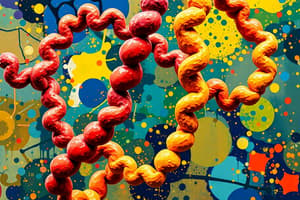Podcast
Questions and Answers
What primarily determines the manner in which a protein folds?
What primarily determines the manner in which a protein folds?
- The presence of ribosomes
- The environment in which the protein is synthesized
- The size of the protein's polypeptide chain
- The primary structure of the protein (correct)
What type of bond connects the amino and carboxyl groups in a polypeptide chain?
What type of bond connects the amino and carboxyl groups in a polypeptide chain?
- Ionic bonds
- Disulfide bonds
- Hydrogen bonds
- Peptide bonds (correct)
Which secondary structure is characterized by a spiral shape?
Which secondary structure is characterized by a spiral shape?
- Beta pleated sheets
- Tertiary structures
- Random coils
- Alpha helices (correct)
How do hydrogen bonds contribute to the formation of an alpha helix?
How do hydrogen bonds contribute to the formation of an alpha helix?
What role do the R-groups of amino acids play in protein folding?
What role do the R-groups of amino acids play in protein folding?
What type of structure do beta pleated sheets represent in protein folding?
What type of structure do beta pleated sheets represent in protein folding?
In the context of folding, the term 'folding cascade' refers to what?
In the context of folding, the term 'folding cascade' refers to what?
What interaction primarily stabilizes the structure of an alpha helix?
What interaction primarily stabilizes the structure of an alpha helix?
What type of bond forms between the carboxyl group of one amino acid and the amino group of another during protein synthesis?
What type of bond forms between the carboxyl group of one amino acid and the amino group of another during protein synthesis?
What is the primary structure of a protein?
What is the primary structure of a protein?
During translation, which molecule is responsible for matching the sequence of nucleotides on the mRNA?
During translation, which molecule is responsible for matching the sequence of nucleotides on the mRNA?
What role does water play in the process of hydrolysis as it relates to polypeptides?
What role does water play in the process of hydrolysis as it relates to polypeptides?
Which property distinguishes the various amino acids incorporated into a polypeptide?
Which property distinguishes the various amino acids incorporated into a polypeptide?
What role do microtubules play in vesicle transport?
What role do microtubules play in vesicle transport?
What occurs during a condensation reaction between amino acids?
What occurs during a condensation reaction between amino acids?
Which motor proteins are involved in vesicle transport along microtubules?
Which motor proteins are involved in vesicle transport along microtubules?
Where are proteins destined for mitochondria, chloroplasts, and peroxisomes synthesized?
Where are proteins destined for mitochondria, chloroplasts, and peroxisomes synthesized?
How do hydrophobic side chains behave in an aqueous environment?
How do hydrophobic side chains behave in an aqueous environment?
What are the two distinct environments found in aquaporins?
What are the two distinct environments found in aquaporins?
What is the significance of the interactions between amino acid side chains in a protein?
What is the significance of the interactions between amino acid side chains in a protein?
The structural configuration of proteins like aquaporins demonstrates which fundamental biological principle?
The structural configuration of proteins like aquaporins demonstrates which fundamental biological principle?
What is essential for motor proteins such as kinesin and dynein to move along microtubules?
What is essential for motor proteins such as kinesin and dynein to move along microtubules?
How does the cytoskeleton contribute to cell function?
How does the cytoskeleton contribute to cell function?
Which of the following best explains how proteins are transported to their destinations within the cell?
Which of the following best explains how proteins are transported to their destinations within the cell?
What happens to proteins synthesized by free ribosomes?
What happens to proteins synthesized by free ribosomes?
Which sequence in a protein directs it to a specific organelle?
Which sequence in a protein directs it to a specific organelle?
What role do the side chains of amino acids play in protein structure?
What role do the side chains of amino acids play in protein structure?
What is the importance of a protein's three-dimensional shape?
What is the importance of a protein's three-dimensional shape?
What type of proteins are primarily synthesized in the cytosol?
What type of proteins are primarily synthesized in the cytosol?
Where do proteins synthesized by bound ribosomes typically go?
Where do proteins synthesized by bound ribosomes typically go?
Why are amphipathic properties of phospholipids critical for cell membranes?
Why are amphipathic properties of phospholipids critical for cell membranes?
What characteristic of proteins synthesized in the cytosol allows them to remain soluble?
What characteristic of proteins synthesized in the cytosol allows them to remain soluble?
What structural components form the aquaporin channel?
What structural components form the aquaporin channel?
How does the aquaporin protein transport water?
How does the aquaporin protein transport water?
What is a consequence of mutations in the CFTR ion channel protein associated with cystic fibrosis?
What is a consequence of mutations in the CFTR ion channel protein associated with cystic fibrosis?
Which structures are used by bacterial porins to form their channel?
Which structures are used by bacterial porins to form their channel?
What role do cytosolic and ER-bound ribosomes play in protein synthesis?
What role do cytosolic and ER-bound ribosomes play in protein synthesis?
What does the core of a single aquaporin monomer allow for?
What does the core of a single aquaporin monomer allow for?
What is the relationship of mitochondrial and chloroplast membranes to porins?
What is the relationship of mitochondrial and chloroplast membranes to porins?
What is a characteristic feature of aquaporin proteins?
What is a characteristic feature of aquaporin proteins?
Study Notes
Protein Structure and Folding
- The amino acid sequence of a protein primarily determines how it folds.
- Peptide bonds connect the amino and carboxyl groups in a polypeptide chain.
- Alpha helix is a secondary structure characterized by a spiral shape.
- Hydrogen bonds between the carbonyl oxygen of one amino acid and the amino hydrogen of another amino acid four residues down the chain help stabilize the alpha helix.
- R-groups of amino acids influence the folding process through interactions like hydrophobic interactions, hydrogen bonding, and ionic interactions.
- Beta pleated sheets represent a secondary structure in protein folding where polypeptide chains align side-by-side forming a sheet-like structure.
- Folding cascade refers to the sequential steps involved in protein folding, from primary structure to tertiary structure.
- Hydrogen bonds primarily stabilize the structure of an alpha helix.
- Peptide bond forms between the carboxyl group of one amino acid and the amino group of another during protein synthesis.
- Primary structure of a protein is the linear sequence of amino acids.
- tRNA is responsible for matching the sequence of nucleotides on the mRNA during translation.
- Hydrolysis breaks down the peptide bonds in polypeptides, and water plays a vital role by providing a hydroxide ion (OH-) to break the bond.
- R-groups distinguish the various amino acids incorporated into a polypeptide chain.
Vesicle Transport and Motor Proteins
- Microtubules provide tracks for vesicle transport.
- Condensation reaction between amino acids releases a water molecule and forms a peptide bond.
- Kinesin and dynein are motor proteins involved in vesicle transport along microtubules.
- Free ribosomes synthesize proteins destined for mitochondria, chloroplasts, and peroxisomes.
- Hydrophobic side chains tend to cluster together in the interior of a protein, away from the aqueous environment.
- Aquaporins have two distinct environments: a hydrophilic channel for water transport and hydrophobic regions that interact with the membrane.
Protein Function and Interactions
- Interactions between amino acid side chains in a protein are vital for its structure, function, and stability.
- Aquaporin protein structure exemplifies the fundamental biological principle that structure dictates function.
- ATP is essential for motor proteins like kinesin and dynein to move along microtubules.
- Cytoskeleton contributes to cell function by providing structural support, facilitating cell movement, and organizing organelles.
Protein Targeting and Sorting
- Signal sequences in a protein direct it to a specific organelle.
- Free ribosomes synthesize proteins that remain in the cytosol.
- Bound ribosomes synthesize proteins that are typically destined for the endoplasmic reticulum (ER) and beyond.
- Amphipathic properties of phospholipids are critical for cell membranes because they allow for the formation of a phospholipid bilayer with a hydrophobic core and hydrophilic surfaces.
- Hydrophilic side chains on proteins synthesized in the cytosol allow them to remain soluble.
Aquaporin Structure and Function
- Aquaporin channel is formed by four transmembrane domains.
- Aquaporin protein transports water through a channel lined with hydrophilic residues.
- Mutations in the CFTR ion channel protein associated with cystic fibrosis can disrupt chloride ion transport, leading to thick mucus buildup.
- Beta barrels are used by bacterial porins to form their channel.
- Cytosolic ribosomes synthesize proteins that remain in the cytosol, while ER-bound ribosomes synthesize proteins that enter the ER.
Porin Structures and Function
- Core of a single aquaporin monomer allows for the passage of water molecules.
- Mitochondrial and chloroplast membranes contain porin structures similar to those in bacterial membranes.
- Aquaporin proteins are characterized by a narrow channel that allows water to pass through but blocks the passage of ions and other solutes.
Studying That Suits You
Use AI to generate personalized quizzes and flashcards to suit your learning preferences.
Related Documents
Description
Explore the intricate details of polypeptide structure in this quiz. Understand the formation of peptide bonds, the role of ribosomes in protein synthesis, and the significance of amino acid properties. Test your knowledge of how these factors contribute to the overall function of proteins.



